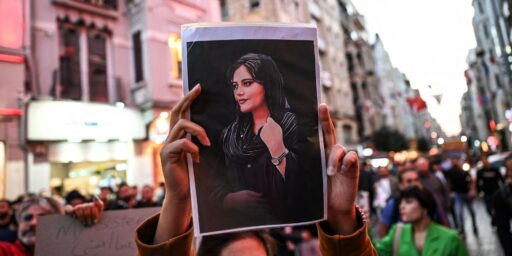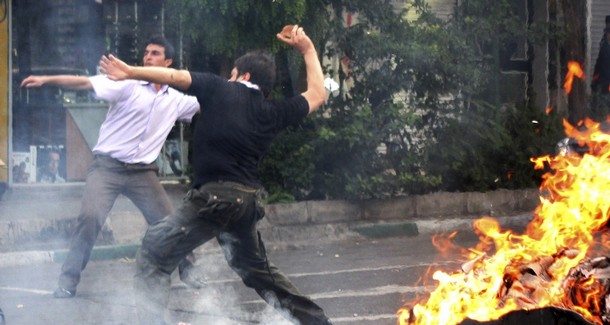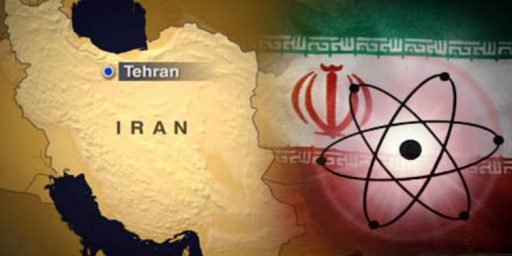Press Coverage of the Iranian Election
Strangely, none of the reportage on the Iranian presidential “election” questions the validity of the outcome. Indeed, the press has treated this as if it were a Western election decided on campaign issues.
The AP story at least acknowledges the nature of the Iranian system, although it treats the results themselves as legitimate:
Election Winner Wants Iran to Be a Model
The victory gives conservatives control of Iran’s two highest elected offices — the presidency and parliament — enabling the non-elected theocracy to rule with a freer hand.
Real power in Iran lies with the country’s clerics and their supreme leader Ayatollah Ali Khamenei, who can overrule elected officials. But reformers, who lost parliament in elections last year, had been hoping to retain some hand in government to preserve the greater social freedoms they’ve been able to win, such as looser dress codes, more mixing between the sexes and openings to the West.
The remaining high profile outlets, though, didn’t even bother to qualify the election.
Hard-Line Tehran Mayor Wins Iranian Presidency (WaPo, A1)
[…] “The people actually did test the reformists during the last eight years, but they didn’t see much from them,” said Rohollah Samimi, 23, as he prepared to vote for Ahmadinejad. “So people here decided to return to the people who are promoting revolutionary values and see if they can bring about change.”
Hardline mayor wins Iran runoff (CNN)
[…] Ahmadinejad had not been expected to even make it into the runoff, but he managed to pull off a surprising second-place finish in last week’s balloting, putting him into the showdown with Rafsanjani.
[…]
The race between Rafsanjani and Ahmadinejad set up a striking choice for Iranians.
Rafsanjani had softened his stance in recent months, calling for improving Iran’s strained ties with the West — including the United States, which has had no formal diplomatic ties with the country since the 1979 Islamic Revolution.
Ahmadinejad called for embracing the principles of the revolution. He had the support of many vigilantes and popular militias, as well as many poor people. He has said he wants to turn some cultural institutions, created in recent years, into mosques.
Hard-Liner Wins Decisively in Iran Presidential Election (LAT)
[…] After being roundly rebuffed by voters in the last two presidential elections, conservatives regained control by painting the reformist camp, represented by outgoing President Mohammad Khatami, as corrupt, ineffectual and out of touch with ordinary people. They were also helped by a trend among many opponents of the Islamic Republic’s religious elite to reject reform as impossible in a country where the constitution gives the unelected supreme leader, Ayatollah Ali Khamenei, control of the main levers of power, including the judiciary and armed forces.
The NYT doesn’t bother to write an original piece, just running the AP story under the headline “Hard-Liner Urges Reconciliation After Victory in Iranian Vote.”
A reader approaching any of these stories without background knowledge would come away with a decidedly distorted view of reality.
Update (0817 6/26): Dean Esmay summarizes a related point nicely, “The Iranian people overwhelmingly boycotted the phony elections in Iran, and the mainstream media is ignoring this.”
Related:
-
President-Elect Wants Modern, Islamic Iran
Iran̢۪s Sham Democracy
Iran Moderate Says Hard-Liners Rigged Election
Iran Votes in Symbolic Presidential Election
Iran Hard-Liners Fear Defeat in Election
Iran Reinstates Reform Candidates
Iranian Reformer Disqualified from Presidential Election
Update: Sent to Carnival of the Trackbacks






While no fan of Iran’s regime am I, it is my understanding that the actual electoral process itself is basically clean (although the first round situation this time raises questions). Of course, evaluating a specific process and the regime as a whole are two different things that needed be conflated. The serious qualifiers vis-a-vis the regime itself are twofold, and both are serious. 1) The presidency has little real power and 2) the Guardian Council has veto power over candidates.
I do think that the likelihood is that the actual contest in Round Two was legit, but that clearly the overall non-democratic nature of the regime has to b considered in evaluating the significance of the outcome.
I will say that simply dismissing the whole process is probably not the correct way to go. The outcome and the process do matter, the question remains as to exactly how much.
A possibility. I’m a little dubious when a candidate who gets into the runoff by questionable means wins the runoff.
Oh, I am dubious of the results. I have decided. however, that this process, while hardly a fully democratic one by any stretch, shouldn’t be dismissed in the way we all rightly dismissed the election in Iraq under Saddam or various “elections” in the Soviet bloc.
There are a variety of interesting things going on here, it seems to me (from the perspective of having studied both elections and regime breakdowns) and therefore have decided that looking at these election and seeing only the sham elements may lead us as analysts (and the US government in terms of making policy) astray.